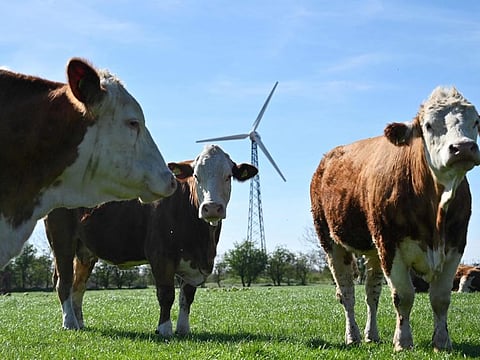Denmark’s major parties agree world’s first carbon tax on emissions by livestock
Emissions caused by flatulence from cattle, pigs will be taxed at rate of $42 per tonne

COPENHAGEN: Denmark’s government said Monday that the country’s major parties had agreed on the details of the world’s first carbon tax on emissions by livestock, to be introduced in 2030.
“We will be the first country in the world that introduces a CO2 tax on agriculture,” Climate Minister Lars Aagaard said at a press conference.
The tax is part of a vast agriculture plan called the Green Tripartite, hammered out by the government with part of the opposition and representatives of livestock farmers, industry and trade unions.
From 2030, methane emissions caused by flatulence from cattle and pigs will be taxed at a rate of 300 kroner ($42) per tonne of CO2 equivalent, a sum gradually rising to 750 kroner by 2035.
However, a basic deduction of 60 percent means the real tax rates will be 120 kroner per tonne emitted in 2030 and 300 kroner in 2035.
Under the Green Tripartite plan, nitrogen emissions would also be reduced by 13,780 tonnes annually from 2027, in a bid to restore Denmark’s coasts and fjords.
High level of oxygen depletion
Oxygen depletion in Danish water catchments is at an alarmingly high level, the statement said.
The Green Tripartite Ministry called the accord “the biggest change to the Danish landscape in over 100 years”.
“Danish nature will change in a way we have not seen since the wetlands were drained in 1864,” Green Tripartite Minister Jeppe Bruus said.
Around 60 percent of Denmark’s territory is currently cultivated, making it the country with the highest share of cultivated land, together with Bangladesh, according to a Danish parliamentary report.
Ten percent of cultivated land will be converted to natural habitat, including 140,000 hectares (345,000 acres) currently cultivated on climate-damaging lowland soils.
The plan also calls for 250,000 hectares of forest to be planted, “enough to go 38 times around the planet”, Bruus said.
“When you travel through the country, it is a difference that will be visible and felt,” his ministry said.
The agreement allocates around 43 billion kroner for the restructuring.
The legislation still must be approved by a vote in parliament, for which no date has been set.
Among the main critics of the plan are right-wing populist parties, including the Danish People’s Party (DF), environmentalist groups such as Greenpeace have said the plan is not ambitious enough.
“The agreement is harmful to Denmark’s economy and makes it more expensive to be a Dane, but doesn’t help the climate since Denmark’s CO2 emissions are minimal on a global scale,” DF party leader Morten Messerschmidt said.
“Lots of people are going to lose their jobs. I find it difficult to see the smartness of this CO2 tax,” Denmark Democrats MP Karina Adsbol wrote on X.
Sign up for the Daily Briefing
Get the latest news and updates straight to your inbox



